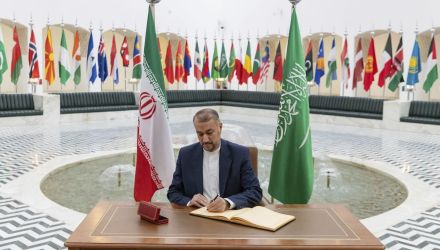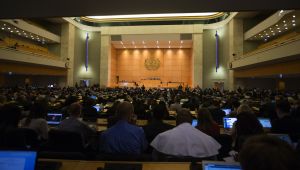Rather than describe China as a competitor, President Bush (who was born in the Year of the Dog) should attach greater importance to a healthy and optimal interaction between Washington and Beijing
With the Chinese Year of the Dog beginning, the United States is still struggling to figure out whether China is a friend or a foe. Dogged by many challenges in bilateral relations, it is crucial for both sides to shake off the mentality of "dog eat dog". 2005 witnessed a resurgence of China, raising unease in the United States. The Pentagon report cautioning China's growing military power speaks volumes about such nervousness. The US trade deficit with China and the revaluation of the Chinese currency added further vitriol to bilateral relations.
The future direction of Sino-US relations will largely depend on how the US perceives a re-emerging China. A good trend once emerged when the US Deputy Secretary of State Robert Zoellick defined China as a shared responsible stakeholder of the international system.
Many Chinese interpret "stakeholder" to mean that Washington has reoriented its policy toward China to a more equal footing. However, President George W Bush's State of the Union address re-emphasised that China was a competitor, which risks sliding back to an adversarial mentality toward China.
In fact, "stakeholder" means more inter-locked interest, more inter-dependence and more shared responsibility. As the world's largest developing country and developed country respectively, China and the US could mutually reinforce or hurt each other's interests, and they must together play responsible guardians of world peace and security.
Frictions over trade and currency issues with China, the de facto "stakeholder" of the US economy, will continue riding on the tide of US domestic politics in 2006. It is estimated that the US will have a trade deficit of over 200 billion with China in 2005. The congressional election in November could refuel the trade and currency dispute. However, "stakeholders" also means that both gain from cooperation and both have much to lose from conflicts.
After all, bilateral trade reached more than 5 billion in the first three quarters of 2005. China has become America's fourth largest export market, second largest import source and third largest trade partner.
The North Korean and Iranian nuclear problem will become a major test for China's stakeholdership in the coming year.
With Iran snubbing the European efforts and upping its ante on nuclear programmes, Washington's reliance on China will be much heavier than simply controlling Pyongyang's nukes.
China has worked diligently to bring Pyongyang back to the international community as a non-nuclear player, as most recently evidenced by Kim Jong-Il's tour to China including visits to the high-tech firms.
China's traditional relationship with Teheran and its veto power in the United Nations Security Council appear to be more valuable than ever to Washington in scrapping the nuclear ambition of a defiant Iran.
Following Germany's call for "six-party talks" over the Iran nuclear row, China, together with Russia, has actively joined the European troika in this effort. The elevating of China to the stakeholder role indicates that Washington is learning more about China to control the world's most dangerous proliferators.
On the Taiwan issue, China's stakeholdership is still crucial but less salient. Cross-Strait tension has eased with increasing economic, cultural and societal interaction.
The Chinese leadership has become more confident in handling the issue, including historically courting the Taiwanese opposition parties in 2005.
For Washington, it's wise to recognise China's rising importance. The Taiwan leadership's independence tendency makes Washington's attempt to maintain the status quo across the Taiwan Strait more difficult.
As observed by a savvy Chinese internet-surfer: the Taiwan issue has become the chicken ribs to Washington—hardly worth eating but possibly good enough not to throw away.
Chinese President Hu Jintao's scheduled visit to the US this April will help clarify Washington's expectation of a Chinese stakeholder. As the two "top dogs" in China-US relations, Mr Hu and Mr Bush will have the opportunity to determine how they can orient the two countries away from "dog eat dog", and into mutually beneficial and peaceful coexistence.
If China and the US deal with each other in an adversarial framework, then there's a dog's chance that bilateral relationship will be a win-win one.
The US is China's top foreign policy priority and the relationship is one China wants to improve.
Hopefully President Bush, who was born in the Year of the Dog (1946), will attach greater importance to a healthy and optimal interaction with China in 2006. If these two leaders improve their relationship, the "lucky dog" in the year to come will be all of us.
Anne Wu is a fellow at the Belfer Center for Science and International Affairs at Harvard's Kennedy School of Government.
Wu, Xiaohui (Anne). “Dog Eat Dog in the Year of the Dog?.” The Bangkok Post, February 9, 2006




